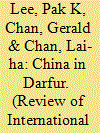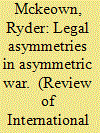| Srl | Item |
| 1 |
ID:
117045


|
|
|
|
|
| Publication |
2012.
|
| Summary/Abstract |
Most people hold that in its quest for natural resources abroad, China shields rogue states with egregious human-rights record from international opprobrium and sanctions. Its political support for Sudan is a case in point. By examining Chinese perspectives on humanitarian intervention and national sovereignty, this article first argues that Beijing's interests are so multiple and complex that concern about the implications of humanitarian intervention for national integration is more crucial than oil in determining its policy towards Sudan. Paradoxically it asserts that China, a non-democratic country, is more influential than liberal democratic states in making the rules of humanitarian intervention in Darfur because of a lack of political will in the West. In addition, there are early signs that China intends to utilise its newfound power to remake international rules regarding territorial sovereignty. Further development is likely to be shaped by its interactions with the United States.
|
|
|
|
|
|
|
|
|
|
|
|
|
|
|
|
| 2 |
ID:
139572


|
|
|
|
|
| Summary/Abstract |
Standard conceptions of the relationship between international law and war in International Relations (IR) mostly oscillate between the sceptical view that law is mostly irrelevant in times of conflict, and the optimistic view that law is a meaningful moral standard that effectively constrains violence. Modern asymmetric conflicts between liberal democratic states and non-state actors such as the Taliban, al-Qaeda, or Hamas challenge these conceptions, however, as they are at once increasingly legal and extremely violent. Drawing inspiration from IR and International Law (IL) scholarship from multiple theoretical paradigms, this article examines the legal asymmetries before, during, and after asymmetric conflict. Noting that law is at once a useful tool and a strong normative force, it argues that a good understanding of legal asymmetries can supplement existing theories of asymmetric war, continue the dissolution of false dichotomies and open up interesting avenues of research in IR, and help both scholars and policymakers understand how international law influences modern asymmetric conflict against non-state actors.
|
|
|
|
|
|
|
|
|
|
|
|
|
|
|
|